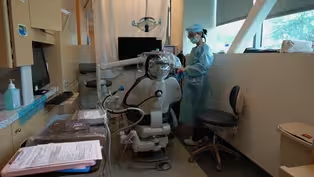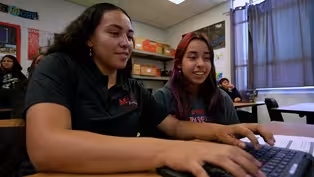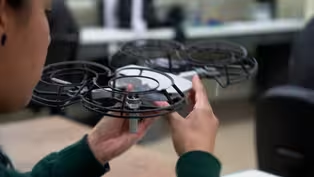Inside California Education
Helping Our Youngest Students
Clip: Season 5 Episode 6 | 5m 19sVideo has Closed Captions
See how this Sacramento community college is increasing the number of childcare workers.
See how this Sacramento community college is helping to increase the number of childcare workers.
Problems playing video? | Closed Captioning Feedback
Problems playing video? | Closed Captioning Feedback
Inside California Education is a local public television program presented by KVIE
Funding for the Inside California Education series is made possible by the California Lottery, SchoolsFirst Federal Credit Union, Stuart Foundation, ScholarShare 529, and Foundation for the Los Angeles Community Colleges.
Inside California Education
Helping Our Youngest Students
Clip: Season 5 Episode 6 | 5m 19sVideo has Closed Captions
See how this Sacramento community college is helping to increase the number of childcare workers.
Problems playing video? | Closed Captioning Feedback
How to Watch Inside California Education
Inside California Education is available to stream on pbs.org and the free PBS App, available on iPhone, Apple TV, Android TV, Android smartphones, Amazon Fire TV, Amazon Fire Tablet, Roku, Samsung Smart TV, and Vizio.
Providing Support for PBS.org
Learn Moreabout PBS online sponsorship♪♪♪ Jeannette: Many people know about this shortage we have of teachers, but we haven't really thought about the shortage of who's taking care of our youngest children.
Narr: For Jeanette Mulhern, it is one of the biggest challenges facing California public education.
The Golden State has a dramatic shortage of both educators and childcare providers.
That's why the department chair of the Early Childcare Education Department at Sacramento's Cosumnes River College is leading the school's effort to prepare the next generation of childcare workers.
Cosumnes is also expanding its effort to meet the workforce need for and access to early childcare education.
Jeannette: Our focus is really looking at can we provide a program that they move through beyond just the minimum number of units to work at a commercial based, um, childcare setting.
Narr: The childcare workforce has changed dramatically over the last four years.
Even prior to the pandemic, there weren't enough providers.
Since COVID, the problem has grown.
There aren't enough childcare workers or early childhood education teachers.
Opportunities are few for effective training, and the pay is often inadequate.
Not just in California, but throughout the country.
Jeannette: Everybody knows there was huge impacts, um, all around for COVID, but in particular, um, those health safety, um, precautions, families were home with their children, so they pulled children from programs.
And so, we've really had a concerted effort of reaching out to a lot of specialty populations.
So that's been a new thing for us, um, post-COVID, um, is that we've been working to figure out how can we wrap around students in all of their identities they have?
And our most recent identity that we're, um, focusing on is student parents.
Eddie: As an educator or as a student as well, I think flexibility is a big piece of it.
Um, it's hard for parents, uh, for families to figure out how they're going to work out transportation, childcare and, and all of the education, work, all of those things.
Um, and being on a community college campus or college campus in general can provide you a good number of those, if not all of those.
Vanessa: As a teacher, as a, as a preschool teacher, I think that providing the quality care that children need, uh, is kinda like the most essential, you know, like part of it.
So, providing the quality care for the children, but also helping train the next teachers that are going into the workforce.
Jeannette: And so, were doing things like more online classes.
Um, were working on, um, the idea of High Flex, which is kind of this flexibility where we could be physically there and students could be with us or they could be at home.
Narr: This renewed effort includes incentives, grants, per unit completion stipends, zero text book cost options, tuition reimbursement and more.
Its all provided directly to early childhood education students, through the Child Development Training Consortium.
Students also receive hands on, peer to peer training at the onsite childcare facility.
Shontaye: I started taking courses a long time ago and I, I felt like I was kind of just moving about, but I, I feel like, um, I dont know what this change has been, but I feel, um, supported.
Jeannette: We really wanted to make sure that, um, students understood that identity and that here at Cosumnes River College, like, were gonna fit you in.
Were going to work, and were continuing to work to be more family friendly.
Um, and thats policies, practices that were starting to really look at now.
Narr: While addressing the need for quality childcare for student parents, this campus also offers an onsite childcare facility for Cosumnes River College student parents, faculty and staff, providing students the resource of affordable, quality on campus childcare.
Eddie: Um, theres, theres no replacing that at all.
Um, and, and truly finding a place that cares about your, your child and, and their development and has the capacity and, and the capabilities to, uh, to nurture that development is, is something special.
One of the great things about Los Rios is its such a broad community college district, so you have so many capabilities of how you can fulfill your programs and really meet your needs that meet your schedules.
Narr: Early childhood education courses and child development courses are aligned throughout the state of California.
Students can work towards achieving one of 5 certificates within early childcare education from an infant specialist, assistant teacher or school-aged specialist.
They can also obtain an early childhood associate of arts degree or transfer to a university of higher education.
Jeannette: probably the, the best example of when we see impact, um, it doesnt always come through, um, with grades or final scores or some of those things, but it comes through when we see our students in the workforce and thriving.
Um, when we see our students who are advocating for children and families.
Community College Bachelor’s Degree
Video has Closed Captions
Clip: S5 Ep6 | 5m 23s | Community college students can now earn bachelor’s degrees at some two-year schools. (5m 23s)
Video has Closed Captions
Clip: S5 Ep6 | 5m 48s | Meet Bakersfield students who will graduate with both a high school diploma and a degree. (5m 48s)
Video has Closed Captions
Clip: S5 Ep6 | 5m 9s | Discover why the sky’s the limit for careers in the drone industry. (5m 9s)
Providing Support for PBS.org
Learn Moreabout PBS online sponsorship
- News and Public Affairs

Top journalists deliver compelling original analysis of the hour's headlines.

- News and Public Affairs

FRONTLINE is investigative journalism that questions, explains and changes our world.












Support for PBS provided by:
Inside California Education is a local public television program presented by KVIE
Funding for the Inside California Education series is made possible by the California Lottery, SchoolsFirst Federal Credit Union, Stuart Foundation, ScholarShare 529, and Foundation for the Los Angeles Community Colleges.


